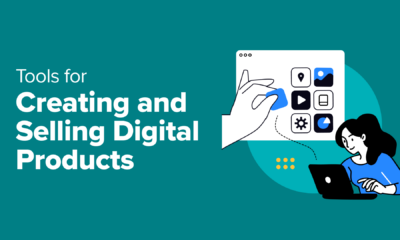SEO
14 Universal Digital Marketing Skills You Can’t Ignore
Social media marketing, search engine optimization, email marketing, marketing automation… the list of digital marketing specializations goes on and on. Of course, they are all different. Yet when you do enough of them in your career, as I have for the past 14 years, you start to identify certain skills that are fundamental to all of those specializations.
The sooner you start to learn those “universal” skills, the better—because those skills act as investments. They will pay off nicely when you work your way toward becoming an expert in a given field or when you switch to another marketing specialization that’s currently trending.
So let me tell you a bit about these universal skills:
- Data literacy
- Understanding different marketing channels
- Copywriting
- Getting around essential digital marketing tools
- Basic design skills
- Assertiveness
- Social intelligence
- Critical thinking
- Curiosity (constant learning)
- Adaptability
- Strong work ethic
- Performing experiments
- Coping with pressure
- Understanding code
Digital marketers swim in a pool of data all of the time. Insights come from data, decisions are based on data, results are in the form of data, and your reports will be filled with data too.
I’m talking about metrics, graphs, trends, and statistics, not to mention the more advanced stuff like predictive analytics. It’s important to develop an appreciation of these things because marketers are required to do these four things really well:
- Report on the past – Example: calculate the conversion rate from trial signups to paid subscriptions
- Analyze the present – Example: calculate the lifetime value of customers
- Predict the future – Example: what type of message can increase your chances of converting the user
- Compare with competitors – Example: what keywords your competitors target that you do not
And all of those four things are impossible to do without knowing where to look for data and how to work with it.
But let’s make it clear: You don’t need to be a data scientist in this role. You have to be data literate. You must learn how to collect, read, and communicate data.
A good example of the level of data literacy you’ll need is shown in this article on creating SEO reports. This is especially recommended if SEO is the specialization you wish to excel in.
Or take this article on 10 Google Sheets Formulas Every SEO Should Know. Stuff like this is your friend in the digital marketing world. It helps you work more efficiently. It makes your work possible in the first place.
How to get better at it
Certifications and courses. You should work on those even if your future employer doesn’t require you to do so. Despite what other people may say, these don’t help you get your next job. But the true reason for doing these courses is to boost your skills and confidence.
Just think about it. To hone the data skills, you need to practice. And to make your skills actionable (not like learning a new language on totally abstract sentences Duolingo-style), you need to practice on real problems. And then you need to be guided on what to learn. Because how can you know this, right?
Here are a couple of courses to get you started:
Even if you don’t specialize in a particular marketing channel, you still need to understand how all of them work and what to use them for. That’s because:
- There is a high probability you will need to work on the intersection of various digital channels (e.g., in a startup or in a small team).
- Your target audience will most likely hang out on different websites and platforms.
- You can improve communication with other people on your team.
- You will make a better decision on what to specialize in.
Let’s face it. Brands today need to embrace something called omnichannel marketing. It’s when a brand is present on, ideally, all marketing channels a prospect is likely to use. Plus, the company should ensure all of those channels work together to create a seamless experience for the prospects.

What this means for digital marketers is that they need to become experts at some of those and understand all of them.
For example, when trying to reach potential customers through search engines, you’re going to think in terms of SEO: search volume, ranking difficulty, SEO content, link building, etc.
But since that same content can be repurposed on other channels, you may want to turn, say, an article into a Twitter thread. Then you’re thinking in terms of short, zero-click content, post engagements, etc.
In a small team, you do that all alone or with somebody who helps you with some deliverables.
As a manager, you may not have direct contact with any of these channels. But it sure does help you understand what your team is doing.
How to get better at it
Try to develop a new kind of “inquisitive” perspective for what you see every day on the internet. So not only consume content from your favorite creators on the web. Try to analyze how they did what you like so much or what made thousands of people engage.
Some creators directly share the secrets of their workshops. At Ahrefs, we do this quite often. In fact, you can learn from our blog and YouTube channel everything that we do for digital marketing. For example, here’s our very own Sam Oh explaining how to overcome some struggles with video creation:
https://youtu.be/QCgDIhvFkCM?t=547
From that point, it’s all about applying what you have learned and analyzing the results.
Only video marketing and podcast marketing don’t utilize text as the main medium. However, even videos and podcasts start as text.
If you like writing, that’s great. This is because you will have a chance to get better at it, as there’s a lot of that in digital marketing. If you don’t like to write but are still serious about digital marketing, try some writing courses—maybe they’ll change your mind.


Believe it or not, we have debated what our tagline should be like for quite some time. How to convey what an all-in-one tool does in one short sentence?
How to get better at it
First, we need to reiterate something: Everyone can learn to write well. Sure, some people may possess a “natural talent” for writing, but this job isn’t about creating the next blockbuster novel or film script. It’s about developing a workshop on writing clearly and convincingly.
On top of that, the web is quite specific when it comes to marketing communications because:
- You can write with the help of writing assistants, so grammar is not so scary anymore.
- Things don’t need to be perfect, as the web is used to imperfection. Plus, you will often have that “edit” button.
- Utility trumps creativity.
To get you started, here’s a great, free guide on writing by Julian Shapiro.
Marketing technology, or martech, is what makes the job of digital marketing possible in the first place.
Moreover, better tools can make you a more effective marketer. Some tools just allow you to work faster, share your work easier, and get better results.
Try this: skim through some job boards in a specialization that’s interesting to you. You will start to see the expectations employers have of digital marketers are connected with certain tools.


For example, last time I checked, Ahrefs is a required tool for some 900 jobs in the U.S. (jobs posted on LinkedIn).
How to get better at it
A lot of the essential marketing tools have free trials or even free versions. On top of that, they often have certification programs and other types of educational materials.
For example, if you want to start doing SEO with zero budget, you can get Ahrefs Webmaster Tools for free and hone your skills using educational materials on our site (as I said, you can literally learn everything we do from there).
One path you can take is to start with this introduction to AWT and learn more about Ahrefs and SEO for free in the Ahrefs Academy.
In some instances, you won’t even need a website. For example, Google Analytics has a demo account with prefilled data. On top of that, it has a free certification program.
Generally, there are a ton of different marketing tools out there. But if there’s one tool you definitely need to be acquainted with, it’s Google Sheets (or Excel, if you prefer). But eventually, all roads lead to Sheets. Just browse through Sheets for Marketers to see what kinds of reports you can build with this free tool.
If some tools you want to train with are out of reach, it’s still a good idea to start with the free ones. First off, tools in their respective categories are fairly similar when it comes to structure and core functionality. Second, it’s still a valid way to develop skills relevant to your specialization.
If you think that design is about colors and pretty pictures, digital marketing will challenge that belief time and again.
Design is a language.
With design, you can show the user where to click. With design, you can convey what your brand is about.
In smaller teams, you will need to design stuff on your own. In bigger teams, you will need to communicate with your design team through wireframing and design terminology.
Also, having an eye for detail and a taste for this craft really helps. This is because, as a digital marketer, you’re going to decide on that stuff a lot.
How to get better at it
You should:
- Understand the basic web design principles.
- Learn how you can create better experiences for your users with UX design.
- Follow web design trends.
- Start experimenting with design software. What do marketers design? Usually, those are graphics for content, ads, infographics, presentations, wireframes and, sometimes, entire landing pages. The general rule is that you will be able to design almost anything using professional tools for graphic designers (Photoshop, Illustrator, Gimp). But there’s a steep learning curve, and the process may take some time. I believe marketers generally prefer streamlined tools (Canva, Genially) and tools dedicated to creating digital products (UXPin, Figma, Webflow).
Assertiveness is the ability to express your opinions and stand up for your own beliefs without being hostile or aggressive.
It’s the art of saying “no” in the workplace. It’s the art of firmly admitting to a mistake in the workplace. And it’s the art of confidently expressing appreciation for others in an environment that is competitive by design.
How to get better at it
Practice saying “no” and saying what you really want to say.
Now I’m no psychologist, but I agree with this article from Healthline. It’s a good idea to start practicing assertiveness in some typical, everyday life situations. You can try to:
- Speak up when you’d rather watch a movie at home instead of going out.
- Let your partner know you won’t be able to do a specific errand; don’t be tempted to offer a full backstory.
- Visit a new restaurant and ask for a table that’s in a quieter area or near a window.
Want to become a manager? Start with social intelligence skills. Want to work more efficiently with various contractors? Start with social intelligence skills.
Once you understand how little you differ from other people, you’ll start to speak their language and get work done together more efficiently—without hating your workplace.
How to get better at it
Work on these skills:
- Active listening – This involves being open-minded and empathetic toward others and recognizing their intentions (not everyone is a skilled communicator).
- Fostering positive feelings – A number of studies have shown that this is crucial to effective leadership.
- Observe managers in your workplace and try to identify how their actions and words affected others (if possible) – Did they inspire people to do better work? Do people feel comfortable sharing opinions around them? Or maybe they do things that cause totally unexpected reactions? What would you do differently?
The world of digital marketing is flooded with advice. Some good, and some not so good.
The thing is that you won’t know the difference if you don’t apply critical thinking to what you read, hear, or watch. Including this article.
Sometimes, critical thinking can be the very thing that saves you and your brand from bad marketing ideas. Experimentation is one thing, but some ideas are bad right off the gate:


How to get better at it
You can think of critical thinking as healthy skepticism. I’m not saying, “Don’t trust anyone.” I’m talking about not accepting things at face value, especially when they lead to important decisions.
This requires you to question ideas to uncover two things: a) the kind of argument or evidence that supports an idea and b) what a given idea leads to.
Based on that, you can develop your own objective, independent opinion.
There’s always something new to learn in digital marketing. New technologies, new tactics, new philosophies, Google’s algorithm updates, industry regulations, etc. You’d want to stay on top of that.
If you like to learn new things on a day-to-day basis, digital marketing is definitely for you.
How to get better at it
Well, I guess things related to digital marketing will either be interesting to you or not. I doubt there is some “hack” to make uninteresting things suddenly interesting without fooling yourself.
What you can consider is optimizing information gathering. Trying to read every interesting article or book on all things digital marketing will make you frustrated, as you likely won’t find enough time to consume all of that information.
Solution: try following content curations, e.g., newsletters curated by industry pros like SEOFOMO.
The market and your goals—those things frequently change in marketing.
One day, you may be working on a blog post; on another, you may be doing some conversion optimization experiments.
On Friday, your company may be the leader in your niche; but after the weekend, some other company may start fighting for the same customers.
How to get better at it
I think it’s all about mindset. You need to acknowledge the fact things can change quite fast in this type of work. And this is not necessarily anyone’s “fault.”
Reacting to change is part of the game. If you’re a perfectionist, this may be tough to deal with. When you start in digital marketing, you may be extrapolating your experience from other areas of life. You may have taught yourself to “finish what you started” each and every time. But when conditions change rapidly, there is no virtue in perfection.
If you’re not reliable, honest, and respectful of others, no one will want to work with you. Seriously.
You may get away with some things every now and then, but this shouldn’t be your norm because this “tendency” will only hinder your capability to work in smarter organizations.
How to get better at it
I believe ethics is an area where a person should make conscious decisions. There’s not much advice I can/should give you here.
But if you ask me, one thing that really matters is understanding what consequences your actions will bring in the long term. Ethics is a marathon:
Plenty of news about Fast, the startup which allegedly generated $600K revenue in 2021, burning through most of their ~$100M funding.
I got a reach out to interview in 2020 but immediately passed. It’s because I did my research on the founder CEO. Real shady actions in the past:
— Gergely Orosz (@GergelyOrosz) April 1, 2022
And don’t forget about critical thinking when seeking advice on the matter of work ethic.


This involves devising hypotheses and designing experiments to validate them. It’s important because, oftentimes, it’s the only way to get an objective answer.
Here’s another reason: the recent popularity of growth marketing. It’s a type of marketing that is characterized mainly by prioritizing data over opinions. And as you may have already guessed, the source of that data is often experimentation.
Experiments will come in all shapes and sizes. Here’s an example where we devised an experiment to find out if it’s possible to build links with Google Ads:
https://www.youtube.com/watch?v=Uz2bGhdnJN0&list=PLvJ_dXFSpd2u_ABxIRO6RVK3ucKyzn96Y
How to get better at it
Here’s a framework you can use to perform your marketing experiments:


- Analyze – Uncover areas of growth opportunities, e.g., look at the events or pages that cause a user to churn or leave the product
- Ideate – Generate ideas on how to improve the focus area and turn them into an idea pipeline
- Prioritize – Prioritize ideas by using the ICE scoring model (impact, confidence, and ease of execution)
- Test – Conduct the experiment and analyze the results
But before you do, you can dip your toes in growth marketing by seeing the video below—years of growth experiments at HubSpot distilled into a beginner-friendly presentation spanning just ~30 minutes.
https://www.youtube.com/watch?v=luNpm9ueFDA&t=672s
Results. This is what digital marketers are hired for.
In marketing, there is always pressure to get results. Because to a lot of companies, there is no such thing as “enough traffic” or “enough sales.”
Having a bad year? Work harder. Having a great year? Great, let’s double that. That’s what you’re going to hear all of the time.
Speaking about time… marketers are always racing against time. Planning ahead and well really helps, but you won’t always be the one in charge of planning.
Every type of organization has its own race against time:
- In agencies, clients demand results ASAP and like to add things at the eleventh hour.
- In startups (especially VC-backed) and small businesses, the hunger for growth and revenue is legendary. There is a reason why most popular growth metrics have time embedded in them (“monthly growth rate,” “annual recurring revenue,” etc.).
- Bigger companies and corporations want to be the best. This means achieving better results in a shorter time than the competition. Also, they like to “squeeze” results before the end of a billing cycle.
How to get better at it
Pressure in digital marketing is normal. Since this is an issue directly related to health and psychology, I will only go as far as telling you what worked for me:
- Assertiveness (point #6 of this article)
- Learning to recognize and enjoy other things in life
- Healthy diet
- Realizing that perfect is not always better (this helps me move faster)
Too much pressure in digital marketing is normal too. (Or should I say “common”?) But there’s a point where pressure stops being your problem and starts to be the problem of the person putting pressure on you.
Sometimes, the only way to cope with it is to find another job. I know. It’s easier said than done. Just remember that your environment has a tremendous impact on shaping your beliefs and attitude. You may thank yourself later for leaving a toxic environment.
Sooner or later, you will be exposed to some form of programming or markup language. How exposed? It really depends.
Your job may require something basic like inserting a tracking tag or editing some lines in your WordPress template. Other times, it may require you to do data analysis for customer databases with SQL or Python.
Learning this skill can save you a lot of time on redundant tasks, especially when you need to perform them at scale. Check out the video below to see an example of how understanding code can make you super efficient at work:
https://www.youtube.com/watch?v=QMk2iaJGpSA
That said, I feel that the no-code movement will make us marketers less reliant on coding and more reliant on martech. But there’s no point in waiting for that moment.
Last but not least, learning code really exercises your problem-solving muscles.
Recommended reading: Excel to SQL: Why You Should Make the Switch
How to get better at it
As with data literacy, it’s best to acquire knowledge by completing courses. Here are some good ones:
Final thoughts
As you may have noticed, I chose not to include creativity as one of the main skills. So what about all those famous marketing campaigns that permeated popular culture? What about Mad Men?
I think that creativity has its role in digital marketing, but it’s just not as much of a fundamental skill. And I’m talking about outstanding creativity here, not the “typical” connect-the-dots creativity that any human being is capable of.
The former can help your ads or any type of content to stand out in the crowd, but it does not guarantee efficiency. And it seems that this quality matters the most in digital marketing.
In my opinion, digital marketing is more of a craft than an art form. It’s about being able to discover what works and repeating it until it works. Though, you may often repeat someone else’s work (and that’s not very creative).
So I’d say that, however grim this may sound, don’t strive for creativity in digital marketing at all costs. Don’t make it your #1 priority, as it can hinder your ability to perform effectively.
Got questions or comments? Ping me on Twitter.









![Holistic Marketing Strategies That Drive Revenue [SaaS Case Study] Holistic Marketing Strategies That Drive Revenue [SaaS Case Study]](https://articles.entireweb.com/wp-content/uploads/2024/09/Holistic-Marketing-Strategies-That-Drive-Revenue-SaaS-Case-Study-400x240.png)
![Holistic Marketing Strategies That Drive Revenue [SaaS Case Study] Holistic Marketing Strategies That Drive Revenue [SaaS Case Study]](https://articles.entireweb.com/wp-content/uploads/2024/09/Holistic-Marketing-Strategies-That-Drive-Revenue-SaaS-Case-Study-80x80.png)


You must be logged in to post a comment Login